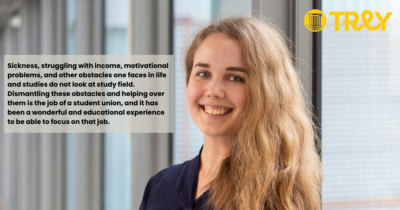I started working in a student union in Spring 2018 when the current student union, TREY, did not yet exist. That began an adventure the like of which I don’t think I’ll experience again soon. The merging of student unions was well on its way, so I got to start building cooperation with the other half of the future student union from the very beginning.
There was a lot to build: like in all fusions, disagreements during the merging of the universities had to be solved together so that they wouldn’t remain and rot the foundations of a new organisation. I have been both an engineering student and a humanist (and a student of social sciences for a bit, too), so I know my share about the prejudices towards students of different fields. I got to help throw those prejudices in the bin on all fronts while we were carving out the building blocks of a new student union together. I believe and hope that was useful.
Now, two and a half years later, that world of confrontation has started to feel very distant—thanks to an open-minded student community and colleagues who work every day for all kinds of students.
What has also affected this feeling, is that I have focused especially on the questions related to study conditions that either hinder or help studies progress. With those things, one’s study field matters very little in the end. An engineering student with a family faces mostly similar scheduling difficulties to those of medical students and students of social sciences with families. A humanist suffering from social anxiety needs the same kind of support as a business student suffering from social anxiety. And if something is for certain, it is that students of no field can say they enjoy doing business with Kela if they lose a summer job due to a global pandemic or their graduation is pushed back because of a university’s information system reform. Not even students of administrative sciences.

Sickness, struggling with income, motivational problems, and other obstacles one faces in life and studies do not look at study field. Dismantling these obstacles and helping over them is the job of a student union, and it has been a wonderful and educational experience to be able to focus on that job. The reforms we achieve—or sometimes stop—are not necessarily huge or even visible to all students, but always, one thing at a time, with advocacy and counselling, we manage to make the life of a student or a group of students better.
I also have to say that however well-meaning and wise the university staff can be, only students are experts in studenthood. Countless times I have brought up views in a meeting or working group that would be obvious to anyone at the student union and heard the response “I had not even thought about that!” If anything, this has only strengthened my idea that students must have representation everywhere decisions on studying or the University’s activity are made. Not because I don’t trust the competence of the staff but because the diversity of viewpoints is a necessary prerequisite for good decision-making and, ultimately, the equal treatment of students.
Although many things are still finding their place, TREY has become a student union unlike anything my pessimist side ever believed was possible. But with hindsight I can ask, what else could these ingredients have created? Tampere is the best student city in Finland, and the student scene here is full of responsible and open-minded people and associations. Now that I’m beginning my study leave to finish my master’s degree, I gladly look forward to returning to this community.